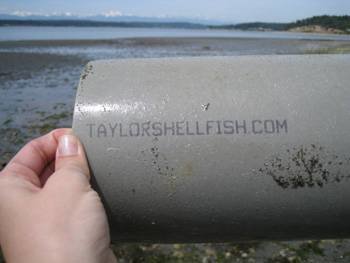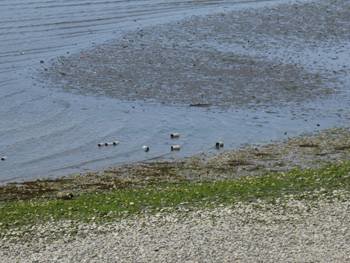 There were no doubts about who was responsible for the tubes found strewn on the beach. Photo courtesy Boysen family
There were no doubts about who was responsible for the tubes found strewn on the beach. Photo courtesy Boysen family
On May 15, the Boysen family found their tideland property south of Vaughn Bay, littered with grey PVC geoduck tubes marked “Taylorshellfish.com.” About a dozen family members were cleaning their cabin and picnicking on the beach. Cathy Boysen Heiberg grabbed a rake and began to collect the debris. Family members joined in and soon collected two garbage bags full of nearly three dozen PVC tubes.
From one side of the tube:
The family photographed the cleanup process and sent it to the website of Case Inlet Shoreline Association in Vaughn. The association posted the photos on their website and their vice president, Curt Puddicombe, sent copies to Pierce County; the state departments of ecology; natural resources, fish and wildlife; and to Taylor Shellfish. Puddicombe received a response from Taylor saying they would look into it and, according to Puddicombe, Pierce County was told by Taylor that there isn’t a problem, it is under control.
“From having grown up out here myself,” says Puddicombe, “I can tell there is a lot of increase in aquaculture type junk. My dad is 86. He notices it, too. When you go out to the beach at low tide you see all these tubes lying around. At a time when we are trying to reduce plastic, they (shellfish growers) are putting it into the environment.”
Puddicombe is a charter member of Case Inlet Shoreline Association and claims deep pioneer roots in the Puget Sound area. His great-grandfather is listed in the first Tacoma census of 1889. As a retired commercial fisherman, he is well acquainted with the salmon and oyster industries in Alaska. His has spent recent years studying current practices of modern aquaculture and the association’s website serves as an archival record of his research. He has developed thorough objections and arguments to many current shellfish farming practices.
It is his view that current practices are wrong for both the environmental and for the social community. He would like to get rid of plastic tubes and the nets; impose greater accountability upon beach debris; and reduce the number of PVC plantings per acre.
“I don’t think any of us are opposed to shellfish aquaculture. They (shellfish industry) want to do it in a way that maximizes profits. We want to see it done in a way that puts environment first and maybe citizens first,” he said.
Above all the concerns about shellfish farming is the issue of aesthetics. Puddicombe says aesthetics is a big part of the Shoreline Management Act, with a purpose to preserve the natural character of the shoreline, as well as the mission of the Case Inlet Shoreline Association, which is to preserve and protect a pristine Case Inlet for future generations.
“Puget Sound is a national treasure. There are more endangered species here than anywhere else in North America,” Puddicombe says. “(It has) a certain peace, tranquility and natural beauty.”
The goal of the association is to protect the habitat of Puget Sound tidelands in relation to expansion of new intensive shellfish aquaculture methods and practices. These objectives have been adopted into Puddicombe’s life.
“It’s when you see something that you intrinsically know is wrong and nothing will change if you don’t do anything. There is an emotional and spiritual connection,” he says about his investment in the Case Inlet Shoreline Association. “We’re not opposed to shellfish farming but how it is done—what is the technique.”
Information about the association’s activities, resources, and membership are available on the website at www.caseinletshorelineassociaiton.com or email at info@caseinlet.org.
 PVC pipes used for geoduck farming littered the beach south of Vaughn Bay on May 15. Photo courtesy Boysen family
PVC pipes used for geoduck farming littered the beach south of Vaughn Bay on May 15. Photo courtesy Boysen family
From the other side of the tube:
At Taylor Shellfish, the director of regulatory affairs is Diane Cooper. She has worked in the Shelton office since 1995 and says that Taylor is always looking for better ways to grow geoduck seed.
“We are working quickly and aggressively to find different ways than PVC tubes,” she said. Cooper attributes the debris found at the Boysen beach cabin a result of the high wind and wave energy enhanced by storms in the first two weeks of May. “That particular area really gets knocked.”
Neighbors can call Taylor to report debris. Patrols are available immediately after a call, according to Cooper. Taylor is permitted to monitor and patrol up to a half mile on each side of a farm site which they do regularly. However, “Vaughn Bay is more than a mile from the (farm) site,” Cooper explains, “Some homeowners don’t care for us to be there.” The patrols and activities are viewable on their website by clicking on “Taylor Shellfish Farms” and clicking on “Farm activity log” at the bottom of the page.
Cooper’s point about being unwelcome is emphasized in the activity log on the Taylor website which reads: “On Dec. 6, Taylor Shellfish had a crew patrolling the beaches south and north of our Stratford-Meyer geoduck farm …as required by Condition 8 of our shoreline permit. That conditions reads, ‘Area beaches within ½ mile on either side of the project site shall be patrolled by the applicant every other week to retrieve debris that escapes from the farm.’ Strong winds and rough waters dislodged some tubes that the crew was retrieving north of the farm. The homeowner approached and threatened the crew with a gun and told them to leave. Our Crew left. It is not possible for us to retrieve debris that may have landed on that homeowner’s property, nor will we attempt to access that property again.”
It is Taylor’s policy to make immediate response to debris reports. Patrols are sent at low tide and people are put out on the beach to clean up. “We’re responsive and sympathetic. We are imbedded in the community were we live,” Cooper saod. “We want to make sure we are good neighbors.”
In addition to the “scheduled patrols and on-call cleanups, Taylor crews schedule spring and fall cleanup patrols each year. The public is invited to join the crews on these occasions.
Taylor Shellfish has been a family held business for over 100 years. The company farms about half of the 9,000 acres it owns. Cooper describes shellfish farming as an industry in a rural area, growing food, providing family wage for employees, and producing a green product. As a scuba diver, Cooper has explored the geoduck, oyster, mussel and clam shellfish farms belonging to Taylor.
“There is an increase in biodiversity on our farms. They are not a monoculture, they are a riot of life,” she says. The farms become their own eco-system. The PVC becomes mini-tidal pools—under nets--that attract native shellfish. We are putting out a 3-dimensional structure that allows all sorts of creatures to move in,” says Cooper and offers to make available a video to KPNews featuring her scuba experiences.
Public education is a focus of Taylor farms from providing K-12 field trips to following the research of University of Washington programs about shellfish planting and harvesting. In March of this year, owner Bill Taylor was presented the Joseph P. McCraren Award for Distinguished Lifetime Contributions to the Aquaculture Industry at the World Aquaculture Conference in San Diego. He was praised for sharing successes, failures and lessons learned with other shellfish growers and for the active role he and his employees take in shaping public policy regarding shellfish farming.
Public visits and boat tours are available, by reservation, to the shellfish farms courtesy of the Taylor Shellfish company. Information is online at www.Taylorshellfish.com or phone 360-432-3300.
UNDERWRITTEN BY THE FUND FOR NONPROFIT NEWS (NEWSMATCH) AT THE MIAMI FOUNDATION, THE ANGEL GUILD, ADVERTISERS, DONORS AND PEOPLE WHO SUPPORT INDEPENDENT, NONPROFIT LOCAL NEWS